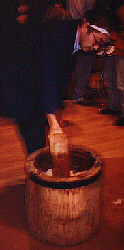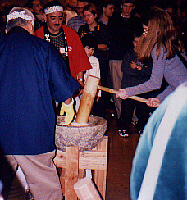Portland, Oregon, USA
Mochitsuki 2000
06 February 2000
I took a couple of visitors from Japan to Mochitsuki 2000. It was held indoors, since the weather in Portland is unpredictable this time of year. My guests found it disorienting to see so many Japanese faces who could speak only English. "Preserving Our Heritage" read a display at the Oregon Nikkei Legacy Center booth. "How is that possible, if you cannot speak the language?" one of my guests asked. The events of the afternoon hopefully answered that question. Mochi (chewy rice in balls or squares) figures prominently in recipies for Japanese New Year food, so an important part of getting ready for the New Year celebration is mochitsuki (mochi making). It used to be a lot of labour, which would bring communities together. Nowadays in Japan, there are electric kitchen appliances that do almost all the work, and ready-to-eat mochi can be bought at the supermarket. Mochitsuki events are seldom seen in Japan anymore.
Mindful of the short attention span of children, the organizers had an ACTIVITY AREA where volunteers taught visitors about shodo (calligraphy), origami (paper folding), using hashi (chopsticks) and playing taiko (Japanese drum). A video played that showed the mochi-making process, and captured the mochitsuki reminiscences of local Nikkei-jin. Part of the afternon was a STAGE SHOW, which opened with Fujinami-kai, the students of a local odori sensei (Japanese dance teacher) who over 40 years has trained three generations of students, from five-year-olds to adults. There was even a male dancer, a European American who owns his own hakama (traditional Japanese men's formal wear). Storyteller Robert Kikuchi-Yngojo of Eth Noh Tec entertained everyone with his tale of three sisters and a magic peach (I think he wrote this himself; none of us knew of such a Japanese folktale). He skillfully wove in a reference to intergenerational issues: the old woman in the woods says something in Japanese to one of the sisters, who cannot find the word in her Japanese-English dictionary. To finish things off, Portland Taiko played a rousing, high-energy set, which, it was announced at the end, was the swan song for a couple of longtime members. After the show, my Japanese guests and I were waiting at a bus stop when a carful of young white men drove by, yelling racist comments. In a way, I am glad that happened -- it showed my guests just what challenges people of Asian heritage have to face all their lives in North America, whether they have been here for three months or three generations. Being from a country where they are the majority, my guests have probably not experienced anything like that. It made the performances we had seen all the more remarkable and commendable.
|
Portland Obon-fest 1999 | Portland Hanami 2000
View my guestbook | Sign my guestbook
| Discuss this topic on the Runker Room "Being Nikkei" Discussion Board |


